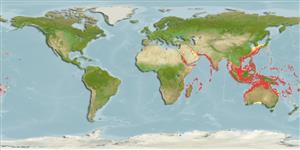Issue
Common names may have to be split accordingly to former synonym japonicus and new species insularis), following distribution (Ref. 123820).
Environment: milieu / climate zone / depth range / distribution range
ນິເວດວິທະຍາ
ສັດທະເລ ກ່ຽວກັນຫີນ; ບໍ່ມີການເຄື່ອນຍ້າຍ; ລະດັບຄວາມເລິກ 4 - 300 m (Ref. 11888). Tropical; 37°N - 34°S, 28°E - 169°W (Ref. 5222)
Western Indian Ocean: restricted.
Length at first maturity / ຂະໜາດ / ນ້ຳໜັກ / Age
Maturity: Lm 27.0, range 23 - 31 cm
Max length : 80.0 cm TL ຕົວຜູ້/ບໍ່ມີເພດ; (Ref. 89707); common length : 50.0 cm TL ຕົວຜູ້/ບໍ່ມີເພດ; (Ref. 5450); ນ້ຳໜັກສູງສຸດທີ່ເຄຍຈັດພີມມາ: 7.0 kg (Ref. 4787); ອາຍຸສູງສຸດທີ່ເຄຍລາຍງານມາ: 29 ປີ (Ref. 42001)
ຄີ (ໜາມ)ແຂງຢູ່ຫຼັງປາ (ທັງໝົດ) : 11; ຄີຫຼັງຂອງປາ (ຄີອ່ອນ) (ທັງໝົດ) : 16 - 18; ຄີ(ໜາມ) ແຂງຢູ່ຄີກົ້ນປາ
ກຸ່ມປາກະດູກແຂງ
ຄວາມຖີ່ຂອງກຸ່ມຖ່າຍທອດພັນ
ປາທີ່ມີການເຄື່ອນຍ້າຍຈາກທະເລໄປຫານ້ຳຈືດ ແລະນ້ຳຈືດຫາທະເລ
ປາທີ່ມີການເຄື່ອນຍ້າຍຈາກທະເລແລະໄປໄຂ່ຢູ່ນ້ຳຈືດ
ຄີກົ້ນຂອງປາ
ສັດທີ່ມີກະດູກສັນຫັຼງ
ການຖ່າຍທອດທາງກຳມະພັນຈາກພໍ່ແມ່ຫາລູກ: 3; ຄີກົ້ນຂອງປາ: 8. Live color whitish, with small dark brown spots on head, body, and fins except ventrally on head, thorax, and lower abdomen. Can assume a transient color phase of 3-4 rows of very large round dark spots on top of the small-spot pattern. 96-125 scales in longitudinal series. Pyloric caeca 26-52 (Ref. 04787); characterized further by having ctenoid body scales, except cycloid scales on nape, thorax, parts of ventral abdomen; body with auxiliary scales; greatest depth of body 2.8-3.3 in SL; truncate to slightly emarginate caudal fin; pelvic fins 1.7-2.4 in head length (Ref. 90102); interorbital slightly convex; preopercle angle rounded, 4-7 enlarged serrae at angle below a slight notch; upper edge of operculum straight; posterior nostril not noticeably larger than anterior nostril; maxilla reaches about to vertical at rear edge of eye; scaly maxilla, low step on posterior part of ventral edge; 2-4 rows of teeth in midlateral part of lower jaw, inner ones about twice the size of outer teeth (Ref. 089707).
Found over a wide range of habitats like seagrass beds and outer reef slopes (Ref. 5213), also on mud bottoms. Solitary (Ref. 90102). Feed on small fishes and crustaceans (mainly stomatopods and crabs). Sexual transition from female to male occurs between 35-45 cm, but not all females change sex. Mature individuals form spawning aggregations (Ref. 55367). E. chlorostigma is closely related and very similar to E. polylepis and E. gabriellae which seem to replace it in the northwestern Indian Ocean. Solitary (Ref. 90102).
Sex change occurs at length of 46.4 cm TL and 3 years of age (Ref. 55367). Also Ref. 6976.
Heemstra, P.C. and J.E. Randall, 1993. FAO Species Catalogue. Vol. 16. Groupers of the world (family Serranidae, subfamily Epinephelinae). An annotated and illustrated catalogue of the grouper, rockcod, hind, coral grouper and lyretail species known to date. Rome: FAO. FAO Fish. Synop. 125(16):382 p. (Ref. 5222)
IUCN Red List Status (Ref. 130435: Version 2024-1)
Threat to humans
Harmless
Human uses
ການປະມົງ: ເປັນສີນຄ້າ
ເຄື່ອງມື
Special reports
Download XML
ແຫຼ່ງອີນເຕີເນັດ
Estimates based on models
Preferred temperature (Ref.
123201): 19.1 - 28.2, mean 25.8 °C (based on 1091 cells).
Phylogenetic diversity index (Ref.
82804): PD
50 = 0.5000 [Uniqueness, from 0.5 = low to 2.0 = high].
Bayesian length-weight: a=0.01047 (0.00646 - 0.01697), b=3.03 (2.90 - 3.16), in cm total length, based on LWR estimates for this species & Genus-body shape (Ref.
93245).
ຊັ້ນເຂດຮ້ອນ (Ref.
69278): 4.0 ±0.67 se; based on food items.
ຄວາມຢືດຢຸ່ນ (Ref.
120179): ຕຳ່, ປະຊາກອນຕຳ່ສຸດທີ່ໃຊ້ເວລາສອງເທົ່າ 4.5 - 14 ປີ (K=0.17-0.19; tmax=29; tm=2-3; Fec = 1,014,818).
Fishing Vulnerability (Ref.
59153): Moderate to high vulnerability (51 of 100).
Climate Vulnerability (Ref.
125649): High to very high vulnerability (73 of 100).
Nutrients (Ref.
124155): Calcium = 19.5 [9.1, 41.4] mg/100g; Iron = 0.438 [0.234, 0.879] mg/100g; Protein = 18.6 [17.0, 20.0] %; Omega3 = 0.136 [0.084, 0.221] g/100g; Selenium = 53.6 [30.9, 95.5] μg/100g; VitaminA = 139 [40, 484] μg/100g; Zinc = 1.06 [0.75, 1.49] mg/100g (wet weight);
